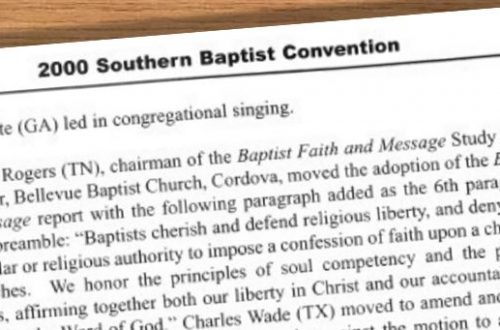Alan Chambers is the President of Exodus International, an evangelical ministry to homosexuals. A couple of weeks ago, I noted that Chambers has changed his views on the usefulness reparative therapy. In the video above, Chambers appears on MSNBC’s “Hardball” to elaborate how his views have changed.
What’s striking to me on these talking head shows is how little these hosts seem to know about evangelical beliefs about homosexuality. It appears that hosts have a caricature in their mind as if evangelicals all agree that homosexuality is all nurture and no nature.
That’s the paradigm that the interviewer is working with in the video above, and it’s why he really has a hard time with Chambers. Labeling Chambers a “pray-away-the-gay leader” is a gross distortion, but that is lost on the host. Chambers doesn’t fit his stereotype, and the interviewer doesn’t know what to do with him.




9 Comments
Nathan Cesal
So what is your answer, Denny? What should gay Christians do? How are you making that happen in your church? What is your success rate? What is your definition of success?
You can criticize the talking heads and bemoan changing legal landscapes, but I’ve never heard any answers from you.
You may have written about it in some form or another, but I’ve never seen a post here where you focus on explaining your solution. Will you please post (or repost, if I’ve missed it) your solution so you and your readership can discuss?
This is a serious inquiry – the world needs answers and you seem confident that you have them.
Thanks!
Ryan Szrama
Seems he would recommend some books and / or articles, likely coupled with personal counsel and prayer through the local church, as this post turned up on a quick Google search shows:
https://www.dennyburk.com/the-gospel-and-homosexuality/
I’m sure you can find more in the Journal of Biblical Manhood and Womanhood, but don’t let me put words in his mouth. I’m guessing he hasn’t exhausted the topic on this blog.
How would you define “success”?
Dan Phillips
Ryan, readers like you give bloggers like me (and Denny, I’d wager) hope.
Denny Burk
Hear, hear.
Paul Jacobs
You deal with this sin much like any other sin. A thief must stop stealing in order to have victory in his/her life. That does not mean that the thief would not be tempted, but you cannot have victory while engaging in the activity. A liar must speak the truth and avoid lies. That means he must get out of politics! An alcoholic must quit his job at the bar. The homosexual will always be tempted toward that lifestyle. However, with proper influences in his/her life, there can be victory.
These urges are “natural” to those who have the proclivity toward this particular sin. Give in to the sin, and the natural becomes a lifestyle. The longer the lifestyle lasts, the harder the road back to victory.
Derek Taylor
At no point in the interview did the interviewer listen to Chambers. It’s painfully obvious that he stuck to his list of scripted questions, many of them filled with baseless assumptions and dripping with patronizing tone. Shameless and shameful interviewer.
Nathan Cesal
I ask for practical answers — what Denny has done within his church and the outcome of those actions — it’s where the rubber meets the road. I get a list of books and articles on theory. I have read this blog for a couple years now; I do read CBMW; I’ve read Living Waters; I’ve read Leanne Payne; etc; etc. I get it. If that’s the kind of hope that you want to give out, so be it, but don’t waste your time patting yourself on the back.
I see a huge relational problem between homosexuals and the church. And I strongly believe it’s a two-sided issue. I’ve heard what you expect gay people to do. I want to know what YOU do to help resolve the problem — bridge the gap. What do YOU do to help gay people achieve the things you promise? Do you just pray the gay away? or do you do something else? If you don’ have an answer readily available, then you probably have done little to nothing.
I consider success as a local church that is…
…a place where people can be honest. (A)
…a soft place to land rather than a place of harsh criticisms. (A)
…empathetic and accepting of a wide variety of people. (B)
…rightly dividing the word of truth and not expecting people to change things about themselves that aren’t sinful. (B)
…fair in it’s dealings with single people. (C)
…not given to idolizing marriage and family. (C)
…allowing of outsiders the right to exist and live according to their own consciences. (D)
Before you get bent out of shape about me being “soft on sin” — here is some clarification about the above:
(A) even if a gay person has stopped sexual activity and decides to never do that sort of thing again (repented) he is typically not free to be honest about that in the local church.
(B) the church definition of gay wrongly goes way beyond sex — it typically involves some idolization of a gender ideal that if a person isn’t seeking, they are sinful.
(C) gay people are more likely to be single, so whatever problems your church has in dealing with single adults also falls on the gay adult.
(D) you offer a “free choice” to follow God, but then force outsiders to live up to your _religious_ ideals. That’s disingenuous and isn’t helping.
Alan Chambers (@AlanMChambers)
Hey Denny,
Thanks for your thoughtful post. You’re right, they don’t get it. I think in this case, though, he was stunned that I wasn’t saying what he thought I was saying and actually heard me this time. In that case, it felt like a win!
Alan
Ken Temple
I appreciate what Alan Chambers tried to communicate to the MSNBC interviewer. The secularists who call it “pray it away the gay” are indeed calling it a lazy stereotype and it sounds like a lot of the same kinds of ways that many Charismatics approach healing and deliverance kind of ministries.
What Alan did was hopefully clarify to those watching and listening that people will still struggle with temptations, but the temptations in themselves are not sin. But God still has the power to change a person – 1 Cor. 6:9-11; 2 Cor. 5:17 – that change does not mean a total destruction of internal struggle and temptation, but an ongoing growth in sanctification.
I only had one point at which I am confused about –
at the 6:56 mark – Alan said, “I am not telling someone who is Gay identified or happily Gay that they should choose the life I choose to live . . . ”
That sounds like, “I am not telling someone who is homosexual to repent of their sins” –
That is confusing to the Christian worldview. It sounded like he was saying, “If you want to change, God can help you; but you don’t want to change and be “happily Gay”, live and let live”.
While homosexuals have the freedom to continue to sin if they want – we should still tell them to repent and turn to Christ and that there is a judgment and the wrath of God is a reality for those who don’t repent.
Any clarification would be appreciated.